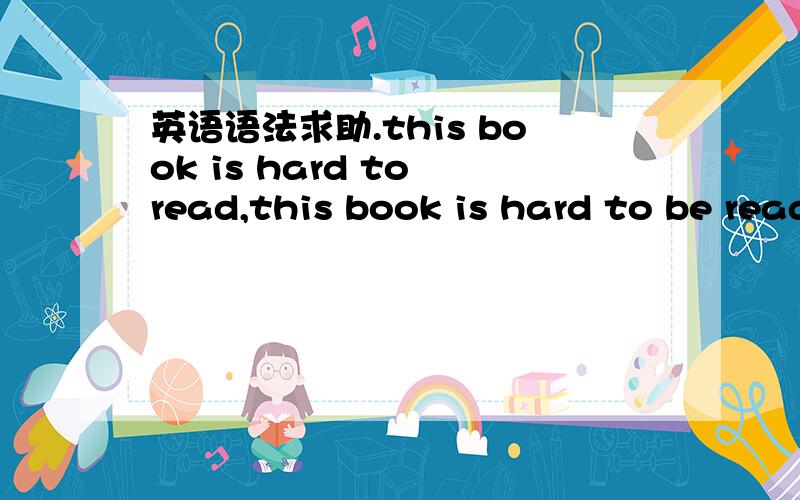英语语法求助.this book is hard to read,this book is hard to be read.应该用主动还是被动呢this book is hard to read,this book is hard to be read.哪个对,为什么,
来源:学生作业帮助网 编辑:作业帮 时间:2024/04/28 13:18:16

英语语法求助.this book is hard to read,this book is hard to be read.应该用主动还是被动呢this book is hard to read,this book is hard to be read.哪个对,为什么,
英语语法求助.this book is hard to read,this book is hard to be read.应该用主动还是被动呢
this book is hard to read,this book is hard to be read.哪个对,为什么,
英语语法求助.this book is hard to read,this book is hard to be read.应该用主动还是被动呢this book is hard to read,this book is hard to be read.哪个对,为什么,
this book is hard to read,这个是主动表被动的一种类型,相关知识点:在“be +形容词+to
do”的结构中,即不定式在作表语的形容词后充当状语,同时,主语是不定式结构的逻辑宾语,此时习惯上以主动形式表示被动意义.这些形容词通常有difficult,
hard, cheap, expensive, enough, sure, fit, nice, dangerous, comfortable,
exciting, good, important等.例如: The text is easy to understand.这篇课文容易理解.
That article is difficult to write.那篇文章难写. The chair is very
comfortable to sit on.这椅子坐起来很舒服.
一般说来,表示被动意义要用被动结构,但是,英语中也有以下几种情况是用主动形式表达被动意义的:
某些连系动词如look, sound, smell, taste, prove, feel等,习惯以主动语态形式表示被动的意义.例如:
The flower smells sweet.这花闻起来香.
Good medicine tastes bitter.良药苦口.
The silk feels soft.丝绸摸起来很软.
但是,当上述动词不用作系动词时,则不具有这种用法.例如:His heart was felt still beating.他的心脏仍在跳动.
Pepper can be tasted in the soup.汤里有胡椒粉的味道.
当open, close, shut, lock, move, read, write, wash, sell, clean, cook, burn,
draw, cut, wear, begin, start, finish, end,
keep等词用作不及物动词表示主语的某种属性、特征或所处状态(常与easily, quickly,
well等副词连用),而非强调动作本身时,通常用主动形式表示被动意义.例如: The table can’t move.这桌子移不动.
The door is easily locked.这门容易锁上. The poem reads smoothly.这诗读起来很流畅.When
does the concert begin? 音乐会什么时候开始? The peaches don’t keep
well.这些桃子不容易保存.
但是,有的时候也要看具体情况而定,例如:This book sells well. So far, 200 books have been sold
out.这种书卖得很好,到目前,已经卖出了两百本. The sentence was read clearly by
her.这个句子她读得很清楚.
3. 在be worth doing, need / want / require doing (to be
done)结构中,其后的动名词一定是以主动语态的形式表示被动意义.例如:The book is worth reading.这本书值得读.The plant
needs watering twice a week.这种花一星期要浇两次. The baby wants looking
after.这个小孩需要照看.
4. 不定式to blame, to let, to seek用做表语时,通常用主动表被动意义.例如:Who is to
blame? 该怪谁呢? She was in no way to blame.决不应该责备她. A better way is yet
to seek..还得找一种更好的办法.
5. 在“be +形容词+to
do”的结构中,即不定式在作表语的形容词后充当状语,同时,主语是不定式结构的逻辑宾语,此时习惯上以主动形式表示被动意义.这些形容词通常有difficult,
hard, cheap, expensive, enough, sure, fit, nice, dangerous, comfortable,
exciting, good, important等.例如: The text is easy to understand.这篇课文容易理解.
That article is difficult to write.那篇文章难写. The chair is very
comfortable to sit on.这椅子坐起来很舒服.
6.
不定式作定语修饰名词或代词时(此时不定式与其所修饰的名词或代词之间存在动宾关系),如果句子中的另一名词或代词(就是句子的主语)可以充当不定式的逻辑主语,即与该不定式之间存在逻辑上的主谓关系,则此时不定式用主动形式表示被动意义.例如:I
have a meeting to attend.我有一个会议要参加.(其中I是不定式to attend的逻辑主语) Have you a
letter to send?你要去寄信吗?(you是to send的逻辑主语).
但是,当不定式的逻辑主语与句子的主语不一致时,则不定式就需要用被动语态.例如:Have you a letter to be sent?
你有信要我去寄吗? (该句中不定式to be sent与主句主语you之间不存在逻辑上的主谓关系.)
7.在“疑问词what/which/whom+不定式”结构中,有时以主动形式表被动意义.例如:The question is which to
choose.问题是挑选哪一个. He will advise you what to do.他会建议你们做什么.
8. 在“too...to...”结构中,用主动形式表示被动意思,此时不定式前面可以加逻辑主语.例如: The box is too heavy (for
me) to carry.这盒子太重了,搬不动. The room is not enough (for us) to have a meeting
in.这个房间不是大到足够能在里面开会.